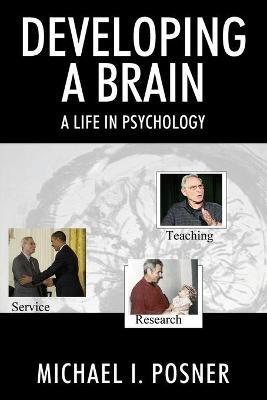Developing a Brain: A Life in Psychology

Developing a Brain: A Life in Psychology
The study of how we think, and feel has undergone a transformation due to our ability to image the human brain. That transformation is described through the life experience of Michael Posner, a central figure, in making the transformation possible. During his three years at Washington University in St. Louis, the first studies were carried out that allowed us to observe individual mental operations by seeing the brain networks active when we listened or read words. These pictures of the living human brain while it thought, were fundamental to the resulting world-wide effort to image brain activity throughout life. Neuroimaging allowed us to observe in less than a second the brain networks that shift attention from one object to another, from thought to thought and how our emotions come to influence our thoughts. Posner was founding director of an Institute in New York city that examined how neural networks involved in attention developed from infancy. The Institute helped bring pediatric neuroimaging to study brain development. Together with his colleague and frequent co-author Prof. Mary K. Rothbart, interventions were designed to see if networks related to the development of the child's ability to control their own thoughts and behavior could be enhanced by training. The book also describes studies designed to improve adult self control and how the findings could be applied to those suffering from mental problems.Following retirement from teaching, and together with colleagues at the University of Oregon, the book describes studies using optogenetics in mice to understand how the physical structure of the human brain activity might change with some forms of training. These studies allow us to actually see the changes in individual connections magnified 16,000 times.The final chapter discusses not only Posner's personal legacy in the members of his family, but also the current status and future prospects of understanding early development of cognitive and emotional control, how we learn and the mechanisms of consciousness. All question to which he contributed and hopes for greater understanding in the future. This volume is intended to give a personal description of how events influenced the life and thought of a single individual. Hopefully, a large group of people care what has been learned about the human mind from these efforts. Understanding the transformation in psychology might influence what we are able to teach to the next generation.
PRP: 211.30 Lei
Acesta este Prețul Recomandat de Producător. Prețul de vânzare al produsului este afișat mai jos.
190.17Lei
190.17Lei
211.30 LeiLivrare in 2-4 saptamani
Descrierea produsului
The study of how we think, and feel has undergone a transformation due to our ability to image the human brain. That transformation is described through the life experience of Michael Posner, a central figure, in making the transformation possible. During his three years at Washington University in St. Louis, the first studies were carried out that allowed us to observe individual mental operations by seeing the brain networks active when we listened or read words. These pictures of the living human brain while it thought, were fundamental to the resulting world-wide effort to image brain activity throughout life. Neuroimaging allowed us to observe in less than a second the brain networks that shift attention from one object to another, from thought to thought and how our emotions come to influence our thoughts. Posner was founding director of an Institute in New York city that examined how neural networks involved in attention developed from infancy. The Institute helped bring pediatric neuroimaging to study brain development. Together with his colleague and frequent co-author Prof. Mary K. Rothbart, interventions were designed to see if networks related to the development of the child's ability to control their own thoughts and behavior could be enhanced by training. The book also describes studies designed to improve adult self control and how the findings could be applied to those suffering from mental problems.Following retirement from teaching, and together with colleagues at the University of Oregon, the book describes studies using optogenetics in mice to understand how the physical structure of the human brain activity might change with some forms of training. These studies allow us to actually see the changes in individual connections magnified 16,000 times.The final chapter discusses not only Posner's personal legacy in the members of his family, but also the current status and future prospects of understanding early development of cognitive and emotional control, how we learn and the mechanisms of consciousness. All question to which he contributed and hopes for greater understanding in the future. This volume is intended to give a personal description of how events influenced the life and thought of a single individual. Hopefully, a large group of people care what has been learned about the human mind from these efforts. Understanding the transformation in psychology might influence what we are able to teach to the next generation.
Detaliile produsului













